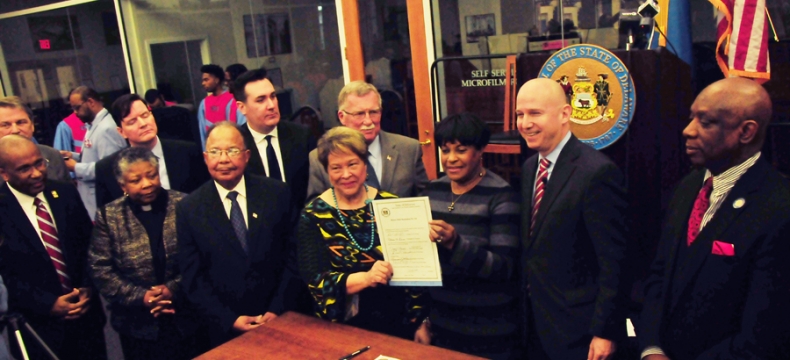
DSU Participates in Slavery Apology Ceremony
Delaware State University took part in a ceremony that featured Gov. Jack Markell’s historic signing of a Joint House Resolution that formally expressed Delaware’s apology for slavery.
DSU President Harry L. Williams participated in the event, which took place at the Delaware State Archives and also had a healthy representation of DSU students, faculty and alumni.
Gov. Markell signed House Resolution 10, which he explained apologizes “for Delaware’s historic role in enslaving people of African descent.” State Rep. Stephanie T. Bolden, who is a DSU alumna (Class of 1969), and State Sen. Margaret Rose Henry were the primary sponsors of the legislation.
“The egregious sin of prior generations is not merely a fact of our state’s past. We cannot separate slavery from the challenges we face today in pursuit of ensuring Delawareans of all races have the opportunities to pursue their dreams and realize their potential,” Gov. Markell said. “A candid acknowledgement and acceptance of our past is the only way to understand our present and take full responsibility for our future.”
After Gov. Markell signed the joint resolution, a contingent of eight members from the DSU Concert Choir sang the Negro National Anthem “Lift Every Voice and Sing.”
For Rep. Bolden and Sen. Henry, the signing represented a legislative victory of historic proportions.
“This is an important step in the history of this State, being the first state to ratify the constitution and the last to nullify slavery,” Rep. Bolden said. “I conclude as I began, asking God to bless the people of this Great State of Delaware as it heals from separate but equal, Jim Crow, the whipping post and all the ills of slavery.”
The DSU president said it was appropriate for DSU to be a part of the Slavery Apology Joint Resolution signing.
“The very property that is now known as Del State’s main campus was formerly owned by the Loockerman family, which owned slaves on this very land. In fact, there are bricks in the current Thomasson Building on campus that came from the slave quarters that existed on the property more than two centuries ago,” said Dr. Williams. “Just like the State of Delaware has come a long way, so has DSU.”

